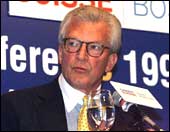There is much appreciation of the appointment of banker David Mulford as US Ambassador to India. Many feel this will take the focus away from the political relations between India and the US to emphasise on deepening economic relations.
 However, Mulford's record in straightening out economic relations between the US and other countries -- Argentina, for instance, where he and his bank, Credit Suisse First Boston, or CSFB (of which he has been international chairman), were important players -- is such that it might be best for India if Mulford were to concentrate on strengthening Indo-US political relations and leave the economy part well alone.
However, Mulford's record in straightening out economic relations between the US and other countries -- Argentina, for instance, where he and his bank, Credit Suisse First Boston, or CSFB (of which he has been international chairman), were important players -- is such that it might be best for India if Mulford were to concentrate on strengthening Indo-US political relations and leave the economy part well alone.
Mulford was assistant to Nicholas Brady, US Treasury secretary from 1988 to 1992, and was involved in evolving the Brady Plan that replaced the region's commercial bank debt with tradeable securities, reopened the international capital markets to Latin America and set the scene for the free market reforms of the 1990s.
This was fine in theory, but Argentina's lack of transparency and democracy led to dealmaking, cronyism and default that only pushed the country deeper into debt.
In June 2001, seven Argentinian banks undertook one of the world's largest debt swaps ever -- the so-called mega-swap, in which $ 29.5 billion of old Argentine government bonds were swapped for new bonds.
The swap was declared a success by the capital markets, though academics said it did not make sense for a country coping with a debt crisis to make itself more indebted. A key consultant to Economy Minister Domingo Cavallo (who backed the swap plan enthusiastically) was Mulford, who was on the board of the Banco General de Negocios, one of the lead managers of the swap.
The Argentinian parliament now says that terms of the swap were altered to allow the lead managers handling the swap huge profits at the cost of Argentina. One of the chairmen of Banco General de Negocios, Carlos Rohm, is under arrest. The other, his brother Joe, is being sought by Argentinian courts.
That Mulford still has abiding faith in the debt swap route out of indebtedness is clear from an article he wrote in the Financial Times recently, arguing strongly that the fate of Iraq's debt (around $ 100 billion) should not be left to the Paris Club to decide (member nations of Paris Club like France and Germany are opposed to occupation of Iraq by US-led coalition forces).
While agreeing that Iraq's debt should be "forgiven", Mulford questions the Paris Club's forgiveness route. He argues for a five-point package: that there should be a three-year moratorium on Iraqi debt payments without interest accruing; an international Iraqi debt commission of financial "wise men" should be established to examine all claims and to disallow debt used for state security or military aggression; only loans for verifiable economic purposes should be collectable; the commission should chair negotiations to restructure the remaining legitimate debt with a substantial reduction in present value through a partial write-off or extended rescheduling.
And, (surprise! surprise!) that there should be a debt/equity swap programme to encourage private investment in Iraq and give companies a role in the rebuilding. Claims, Mulford says, could be sold to investors at deep discounts and redeemed into private sector investments or privatisation.
After 30 years of investment banking, treasury undersecretary-ship during the presidency of George Bush senior, and years in London as financial adviser to Saudi Arabia, Mulford is by no means naive about how money can be made. The question is who should make money, using what means and at what cost.
As queries mount in several Latin American nations about how a handful of banks run by domestic elite who, in turn, had connections with top US Republicans, could be allowed to enrich themselves at the cost of the people of Latin America, Mulford has been asked to take up a post where, hopefully, such questions will not arise.
Last year, Indian regulators banned the local brokerage operation of CSFB for two years for alleged price-fixing. The ban remains in effect until next April. Mulford had nothing to do with what the local branch did. But the Securities and Exchange Board of India will have its beady eyes fixed on CSFB's future India operations.
Mulford has a doctorate from Oxford and has written two books on Africa. Exactly what was on President Bush's mind when he appointed Mulford is not known. But it is curious that before Robert Blackwill returned to the White House from New Delhi, he let it be known that his candidate for the job would be someone who "knows his way around State Department".
But then, bankers know their way everywhere.





